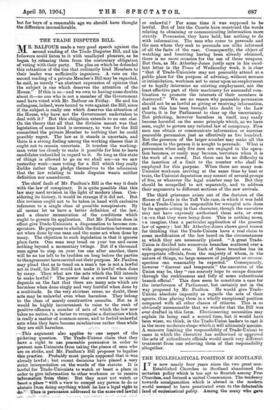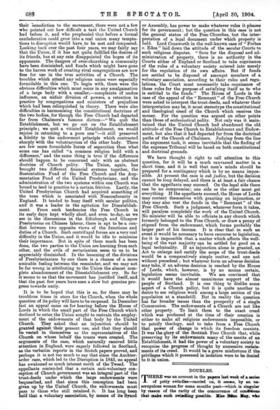THE EQCLESIASTICAL POSITION IN SCOTLANli.
IT is now nearly four years since the two great non- Established Churches in Scotland abandoned the sectarian policy which is too apt to flourish among Free Churches, and formed a united Communion. The tendency towards amalgamation which is abroad in the modern world seemed to have penetrated even to the debateable land of ecclesiastical polity. Among the many who gave their "oenediction to the movement, there were not a few who pointed out how difficult a task the United Church had before it, and who prophesied that before a formal confederation could grow into a real union many tempta- tions to disruption would have, to be met and conquered. Looking back over the past four years, we may fairly say that the Union, if it has not quite fulfilled the desires of its friends, has at any rate disappointed the hopes of its opponents. The dangers of over-churching a community have been diminished, and funds which might have gone to the barren work of creating rival congregations are now free for use in the true activities of a Church. The troubles which attend any religious union were especially formidable in this one. To begin with, there were the obvious difficulties which must occur in any amalgamation of a large body with a smaller,—complaints of undue influence, an unfair division of powers, a retention in practice by congregations and ministers of prejudices which had been relinquished in theory. There were also difficulties in harmonising the 'constitutional doctrines of the two bodies, for though the Free Church had departed far from Chalmers's famous dictum—" We quit the Establishment, but we go out on the Establishment principle ; we quit a, vitiated " Establishment, we would rejoice in returning to a pure one "—it still preserved a fidelity to the endowment principle which contrasted sharply with the voluataryism of the other body. There are few more formidable forces of separation than what some one has called "a common religion held with a difference," and the same thing is true if the difference should • happen to be concerned only with an abstract doctrine of Church polity. The Union, again, has brought two different financial systems together, the Sustentation Fund of the Free Church and the Aug- mentation Fund of the United Presbyterians, and the administration of the two systems within one Church was bound to lead in practice to a certain friction. Lastly, the United Presbyterian Church had acquired something of the tone which is associated with Nonconformity in England. It tended to busy itself with secular politics, and it was a leader in the agitation for Disestablish- meat. From such tendencies the Free Church in its early days kept wholly aloof, and even to-day, as we see in the discussions in the Edinburgh and Glasgow Presbyteries on Chinese labour, there is apt to be a con- flict between two opposite views of the functions and duties of a Church. Such centrifugal forces are a very real difficulty in the Union, and it would be idle to minimise their importance. But in spite of them much has been done, the two parties to the Union are learning from each other, and the evils of sectarianism seem to us to be appreciably diminished. In the lessening of the divisions of Presbyterianism by one there is a chance of a more amicable feeling between the remainder, and we may not be far wrong in attributing to the Union the almost com- plete abandonment of the Disestablishment cry. So far it Seems to us that the movement has justified itself, and that the past few years have seen a slow but genuine pro- gress towards unity.
It is to be hoped that this is so, for there may be troublous times in store for the Church, when the whole question of its policy will have to be reopened. In December last an appeal came on for hearing before the House of Lords in which the small part of the Free Church which declined to enter the Union sought to restrain the employ- ment of the endowments of that body by the United Church. They asked that an injunction should be granted against their present use, and that they should be vested in themselves as the representatives of the Church on whose behalf the trusts were created. The arguments of the case, which naturally received little attention in England, were eagerly followed in Scotland, as the verbatim reports in the Scotch papers proved, and perhaps it is not too much to say that since the Auchter- arder case, which led to the Disruption in 1843, no appeal has awakened so much interest north of the Tweed. The appellants contended that a certain anti-voluntary con- ception of Church government was an integral part of the trust-deeds under which the large endowments were bequeathed, and that since this conception had been given up by the United Church, the endowments must pass to those who still retained it. It has long been held that a voluntary association, by means of its Synod or Assembly, has power to make whatever rules it pleases for its government ; but the question in this case is not the general status of the Free Churches, but the inter- pretation of a legal document under which property is held. Lord Cranworth in the well-known case of "Forbes v. Eden" laid down the attitude of the secular Courts to such religious disputes. "Save for the disposal and ad- ministration of property, there is no authority in the Courts either of England or Scotland to take cognisance of the rules of a voluntary society entered into merely for the regulation of its own affairs. But if funds are settled to be disposed of amongst members of a voluntary association, according to their rules and regu- lations, the Court must necessarily take cognisance of these rules for the purpose of satisfying itself as to who is entitled to the funds." The House of Lords in the case of the appeal of the " Remnant " of the Free Church were asked to interpret the trust-deeds, and whatever their interpretation may be, it must stereotype the constitutional and theological creed of the Church which receives the money. For the question was argued on other points than those of ecclesiastical polity. Not only was it main- tained that the United Church had abandoned the old attitude of the Free Church to Establishment and Endow- ment, but also that it had departed far from the doctrinal paths of the Church of Chalmers. Judging from the line the argument took, it seems inevitable that the finding of the supreme Tribunal will be based on both constitutional and doctrinal grounds.
We have thought it right to call attention to this question, for it will be a much canvassed matter in a short time, and it is well that men's minds should be prepared for a contingency which is by no means impos- sible. At present the case is sub judice, but the decision cannot be long delayed, and there is at least a fair chance that the appellants may succeed. On the legal side there can be no compromise ; one side or the other must get everything. If the appellants succeed, the House of Lords may content themselves with granting an injunction, or they may also vest the funds in the " Remnant " of the Free Church. Such a judgment, whatever form it takes, will paralyse completely the work of the United Church. No minister will be able to officiate in any church which formerly belonged to the Free Church, or draw a penny of stipend from the endowment, which forms probably the larger part of his income. It is clear that in such an event it would be necessary to have recourse to legislation, for it is impossible that a matter which affects the well- being of the vast majority can be settled for good on a legal technicality. If an injunction alone is granted, an Act to enlarge and rectify the scope of the trust-deeds would be a comparatively simple matter, and one not without precedent ; but whatever form an adverse decision may take, if an adverse decision is reached by the House of Lords, which, however, is by no means certain, legislation seems inevitable. We are convinced that it would have the almost unanimous support of the people of Scotland. It is one thing to dislike some aspect of a Church policy, but it is quite another to desire to see religious work among a large section of the population at a standstill. But in reality the question has far broader issues than the prosperity of a single Communion. The endowments of a Church are not like other property. To limit them to the exact creed which was professed at the time of • their creation is either to make all religious endowments impossible, or to petrify theology, and to take from a Free Church that power of change in which its freedom consists. It was the glory of the Scottish Free Church that, while preserving by its endowments many of the merits of an Establishment, it had the power of a voluntary society to recognise the progress of thought by successive restate- ments of its creed. It would be a grave misfortune if the privileges which it possessed in isolation were to be denied to it in union.























































 Previous page
Previous page